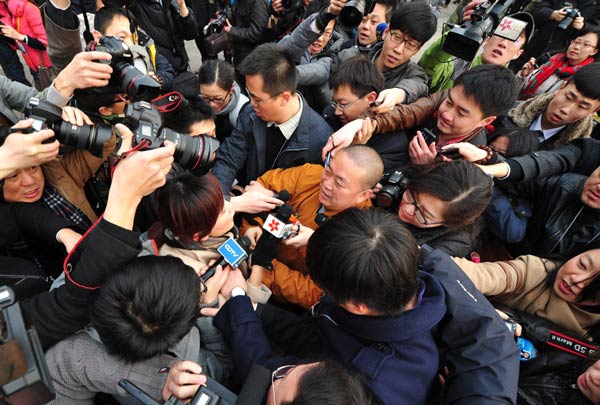 |
|
|
|
|||||||||||
 |
|
Shi Yongxin, abbot of Shaolin Temple, enters the Great Hall of the People for the opening ceremony of the Fifth Session of the 11th National People’s Congress as journalists jostle for photos and interviews on Monday. KE XIAOJUN / CHINA NEWS SERVICE
|
Shi Yongxin, abbot of the Shaolin Temple, said at least 1,000 overseas visitors stay at the temple every year in Central China's Henan province to practice Buddhism and Chinese kung fu, and the number has been increasing.
Another 200,000 Buddhists come from abroad to the temple annually for sightseeing, and groups of foreign practitioners are commonly seen, said Shi, who is also a deputy to the National People's Congress.
"The number is very impressive, considering that Shaolin Temple is located far from cities and visitors have to make a special trip."
Shi also said the temple's traditional Buddhist lifestyle and its palaces, which have been restored over the past three decades, contribute to its popularity.
Master Xue Cheng, vice-chairman of the China Buddhism Association, said the rational and speculative thinking of Buddhism has much in common with Western civilization and can be an effective medium for dialogue between the East and the West.
He said the World Buddhism Forum, held in Jiangsu and Taiwan in recent years, has promoted Chinese Buddhism studies worldwide and also has improved communication with other countries.
The centuries-old temple, however, came under a shadow this year when a national watchdog for tourist attractions warned that it may lose its top rating if it fails to improve its service and maintenance by the end of March.
The scenic site had 61,000 visitors during the seven-day Chinese New Year holiday, and ticket revenues had fallen 13.7 percent year-on-year, Henan-based Dahe Daily reported.
The abbot conceded that tourism has to some extent affected Buddhist practices, but he added that religious activities are always the focal point of the temple and tourism comes second.
"But to simply shut the temple down can only arouse more controversy. What we need to do is to continue improving the service," he said, adding that the ticket revenues are used to feed the monks in residence.
Xue also conceded that Buddhist activities in China need guidance and clearer regulation.
Previous media reports revealed that many temples are now leased to individuals or companies, and have become tools for making money.
"I have read some of the articles, and I agree that they are telling the truth. The problem of temples becoming commercialized and imposters using Buddhism to cheat people has become more serious in recent years," Xue said.
The problem is rooted in the unclear division of responsibilities, he said.
Shi, while echoing Xue, said many temples, especially in central and western China, are not open to the public but under the management of local governments.
Temples in China are usually under several government organs, including bureaus of religious affairs, tourism or gardening, making no single agency fully in charge of the management and supervision.
In some places, companies would build temples and then invite monks to set up a monastery. The temple then would return "profits" to the companies to cover their investment and provide revenue.
"A temple should be a pure place for worship, not a lucrative property," Xue said.
You may contact the writers at zhaoyinan@chinadaily.com.cn and xieyu@chinadaily.com.cn
(China Daily 03/07/2012 page6)